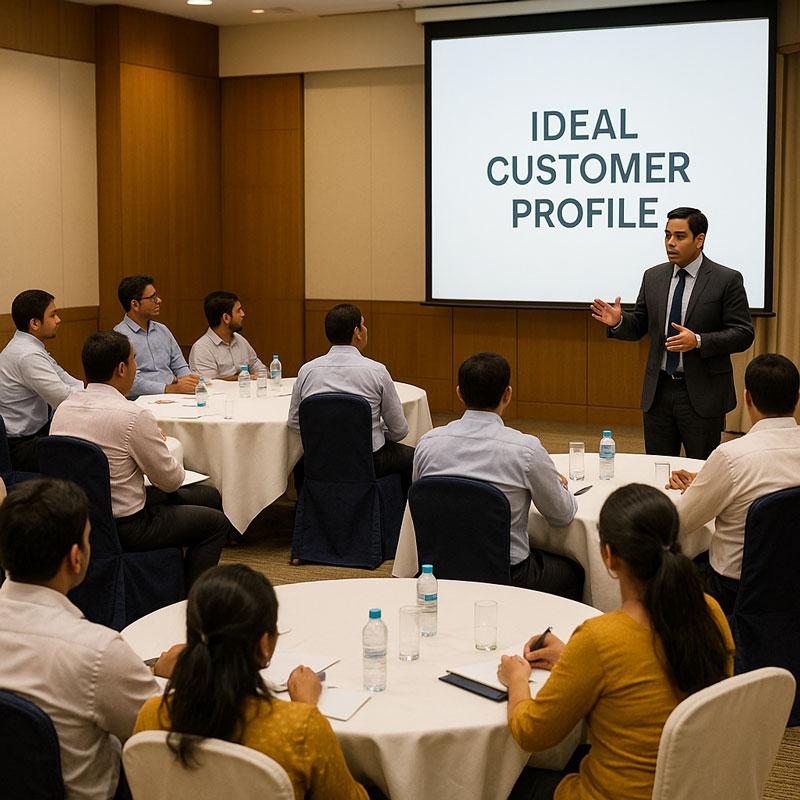
How to Train B2B Sales Reps to Qualify Based on the ICP
When it comes to B2B sales, one of the most common pitfalls is reps chasing deals that should’ve been disqualified early.
Why?
Because those deals never really fit the Ideal Customer Profile (ICP). Sales teams waste precious hours chasing prospects that were never going to buy—or worse, end up with churned customers down the road.
That’s why training B2B sales reps to qualify leads rigorously based on the ICP isn’t just helpful; it’s essential.
Let’s break down how to train your sales reps effectively so they zero in on the right prospects and avoid wasting time on deals doomed to fail.
1. Define and Refine Your Ideal Customer Profile (ICP)
Before you can train anyone to qualify based on an ICP, you need a crystal-clear one.
Most companies make the mistake of creating a vague ICP. Instead, drill down with precision.
Your ICP should include:
- Company size (revenue and employees)
- Industry
- Geography
- Budget range
- Current tools/tech stack
- Common pain points
- Decision-making structure
You need to go deeper than demographics.
- What are their key challenges?
- What triggers them to seek your solution?
- Which customers have had the highest lifetime value or lowest churn?
Use data, not gut feelings.
Once you have this profile, share it in detail with the sales team—this is their blueprint for success.
2. Train Reps to Ask the Right Questions Early
Qualifying out opportunities that don't fit the ICP is also a key skill for B2B sales reps. Training your sales reps to ask high-impact qualifying questions during discovery is crucial.
No fluff—only questions that reveal how closely the prospect aligns with your ICP.
Teach your team to probe on:
- Pain: What’s broken? What’s the cost of inaction?
- Fit: Do they use tools that integrate with yours? Are they in the right industry/segment?
- Budget: Is this a real problem they’re willing to spend on?
- Timeline: Is there urgency, or is this an “exploratory” chat?
Use role-play sessions and shadowing to sharpen their questioning. Give feedback ruthlessly—don’t sugarcoat.
3. Establish a Clear Qualification Framework (Like MEDDIC or BANT)
Many reps operate without a qualification system—they wing it.
That’s a problem.
Train your team on structured qualification frameworks like:
MEDDIC: Metrics, Economic Buyer, Decision Criteria, Decision Process, Identify Pain, Champion.
BANT: Budget, Authority, Need, Timeline.
Whichever framework you choose, make it mandatory in your CRM. Force reps to check every box—or explain why they’re skipping it.
Sales managers should enforce this during deal reviews. If a rep can’t articulate the economic buyer or decision process, that deal goes back to the pipeline.
4. Coach on Disqualifying as a Strength, Not a Failure
Most reps fear disqualifying prospects. It feels like a missed opportunity.
Your job is to rewire that mindset.
Disqualification means more time for good-fit deals. It means less churn. It means a cleaner pipeline.
Celebrate reps who disqualify early based on ICP misalignment. Make it a metric. “Deals disqualified for good reason” should be a success indicator, not a red flag.
Train reps to be honest with prospects: “It seems like this might not be the best fit based on X. Let me recommend an alternative.”
That builds trust and long-term reputation.
5. Use Real Deal Reviews to Show What Went Wrong (or Right)
Theory is great, but nothing beats real examples.
Do regular post-mortems on lost deals.
- Why was the deal pursued?
- Did it really align with the ICP?
- Was there a red flag ignored in the discovery call?
Bring actual call recordings or notes. Walk through them with the team. Highlight where reps failed to qualify hard enough—or did it right and saved the company time.
Bonus: Create a “Hall of Shame” and a “Hall of Fame” with anonymized deals. It’s a powerful teaching tool.
Final Thoughts
Training B2B sales reps to rigorously qualify based on the ICP isn’t a one-time effort—it’s a mindset shift.
You’re teaching them that chasing every deal is a recipe for failure. Instead, they need to become experts at spotting winners early and walking away from losers fast.
When done right, your pipeline becomes leaner, your close rates go up, your sales cycle shortens, and your reps stop burning out on dead-end deals. That’s a win for everyone.
